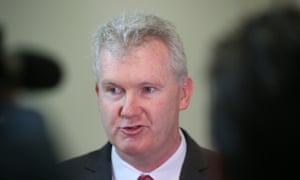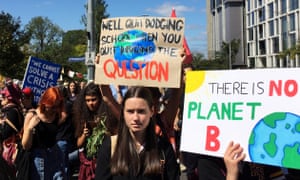Extract from The Guardian
Shadow environment minister says ALP can’t keep pushing a market
mechanism to reduce emissions nor could it ‘give up’ on tackling crisis
The shadow environment minister, Tony Burke, has declared Labor can no longer pursue a climate policy based on a market mechanism to reduce emissions.
But he insists there can be no retreat from what the science says needs to happen to avoid dangerous warming.
In a significant piece of post-election positioning, Burke told Guardian Australia Labor needs to adopt new policies of regulation and spending – like the Green New Deal model pursued by some Democrats in the United States, or like the existing Australian Direct Action model – because that is the only way a majority of Australian voters will sign on to climate action.
While Labor can compromise on the mechanism, Burke says there can be
absolutely no compromise on the science. “The reason we can’t compromise
on the science is this: there’s a limited time for the nations of the
world to act to keep us within 2C.But he insists there can be no retreat from what the science says needs to happen to avoid dangerous warming.
In a significant piece of post-election positioning, Burke told Guardian Australia Labor needs to adopt new policies of regulation and spending – like the Green New Deal model pursued by some Democrats in the United States, or like the existing Australian Direct Action model – because that is the only way a majority of Australian voters will sign on to climate action.
“There is a chance the tipping points are reached before you hit 2C, but if we work on the basis that we’ve at least got until 2C warming before the whole planet takes on its own spiralling cycle of heating up, then compromise on the science is completely unacceptable, perverse and no go,” Burke said in an interview with Guardian Australia.
“If a market mechanism is off the table, there are only two choices – you get into territory that in terms of policy purity you haven’t wanted to go to, or you give up, and if we are being true to being a Labor party, we can’t give up.
“This issue is as much core business for Labor as anything we do in welfare or redistribution of taxation. This is about making sure we are looking after the disadvantaged, except the disadvantaged here isn’t between rich and poor, it’s between present and future.”

But he said Labor had to accept that after successive election losses, the voting public didn’t concur. “We’ve now spent 11 years using market mechanisms to deal with climate change, and for 11 years, the Australian public have been saying no.
“Effectively we’ve based our policies on two principles, both of which are rock solid. The first is follow the science to set emissions targets, and the second is to provide a framework and allow businesses to make decisions within that.”
Burke noted Labor had championed a market model for more than a decade in part because that’s what stakeholders, including major business groups, said they wanted, but he noted the same stakeholders never turned up to champion the reform when the fight got difficult politically. “They have never come to our defence when we have been under attack.”
He said a market mechanism was efficient, but it left Labor politically exposed. “It leads you inevitably to a set of circumstances where you can’t answer questions about the costs to the economy, because the answer will always be it all depends [on market behaviour].
“The hard right went first to a Direct Action model and in a number of ways, so did the environment movement that wanted very specific measures, sometimes even calling for very specific decisions to be made in terms of environmental approvals.”
He said Labor’s approach in this term should be looking at climate policy as an industry policy that would protect blue-collar jobs during the inevitable transition from emissions intensity to decarbonisation. “There may well be a pathway for us to shift to a more traditional industry policy but focused on those aspects of industry that help us meet the targets we need to be able to meet.
“This may end up being particularly pertinent in Queensland, given a whole lot of the minerals required for renewables come from the Mt Isa region.”
Burke said he wasn’t sure whether a 45% emissions reduction target would be the correct threshold at the next election. “Forty-five per cent reduction has been the threshold. I don’t know what that will mean by the time of the next election – whether the 2030 date shifts and the percentage shifts with it – I don’t know because the science will need to be updated.
“It will be updated and the information that comes in – unless we get a massive surprise – will continue to be worse. For a long time climate scientists have projected a range of outcomes from modest shifts to more alarming outcomes, and consistently the lived experience has been at the more alarming end of those outcomes.”
A number of senior figures have signalled Labor will go back to the drawing board on all major policies after losing the weekend election to the Coalition, including climate policy.
While there will be solid internal support for continuing to pursue an ambitious policy within Labor ranks, there will also be a push in the opposite direction from regional MPs concerned about the party’s ability to hold coal regions when local communities are concerned about unemployment.
Burke’s early positioning is an effort to swim across that rip and direct the internal recriminations towards a result that can square the two imperatives.
Burke, from the New South Wales right faction, is backing leftwinger Anthony Albanese to replace Bill Shorten as the federal Labor leader.

No comments:
Post a Comment